#jjk 210
Text
⚠️ JJK 210 ❗❗
KID MEGUMI WITH DAD GOJO I -🥺💗 HE'S SO ADORABLE —
AND NOBARA CRUMBS!!!! 😭😭😭 GEGE IS THIS A SIGN SHE'S COMING BACK SOONER??!!!
#jujutsu kaisen#jjk#jjk spoilers#fushiguro megumi#itadori yuji#itafushi#kugisaki nobara#anime#fushiita#gojo satoru#dad gojo#jjk 210 spoilers#jjk 210#kid megumi#they're so adorable#nobara come back#gege bring back nobara
2K notes
·
View notes
Text

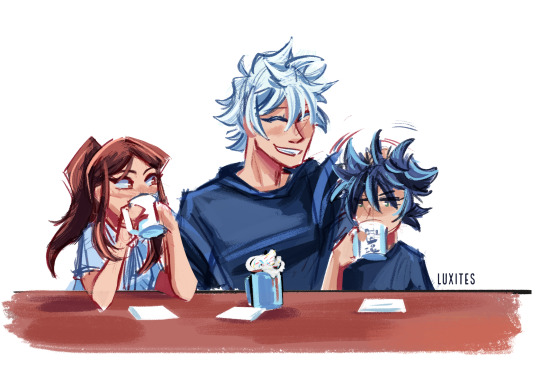
I never thought that we'd actually get a canon glimpse of Gojo taking care of little Megumi..... still can't believe it happened
I would love to see more in the future 😭💙
#Jujutsu Kaisen#JJK#JJK Spoilers#Gojo Satoru#Satoru Gojo#Megumi Fushiguro#Fushiguro Megumi#Tsumiki Fushiguro#Fushiguro Tsumiki#JJK 210#luxites art#messier than what I'd usually like to post BUT I lost the art with Tsumiki by...#accidentally saving over it..... so that'll have to do!
996 notes
·
View notes
Text
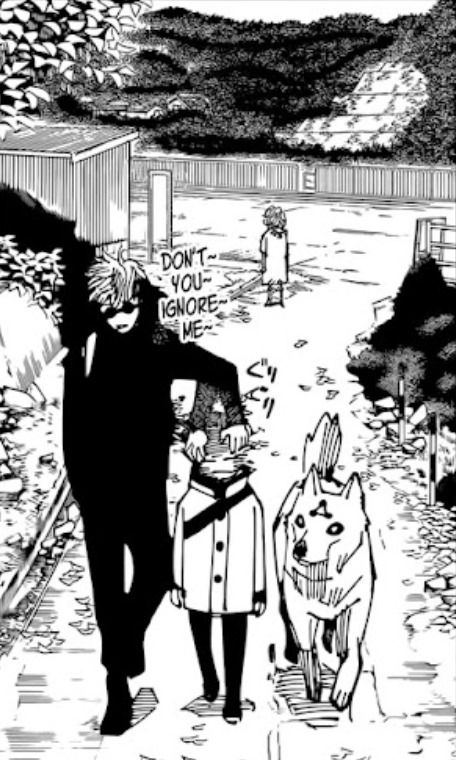
Anyone else crying over dad gojo tonight?
#god they are so important to me#gojo was megumi and tusmiki's dad#no one is telling me otherwise#dad gojo#megumi fushiguro#satoru gojo#jjk#jjk 210#love how we ignored that hana had a crush our sea urchin
101 notes
·
View notes
Text
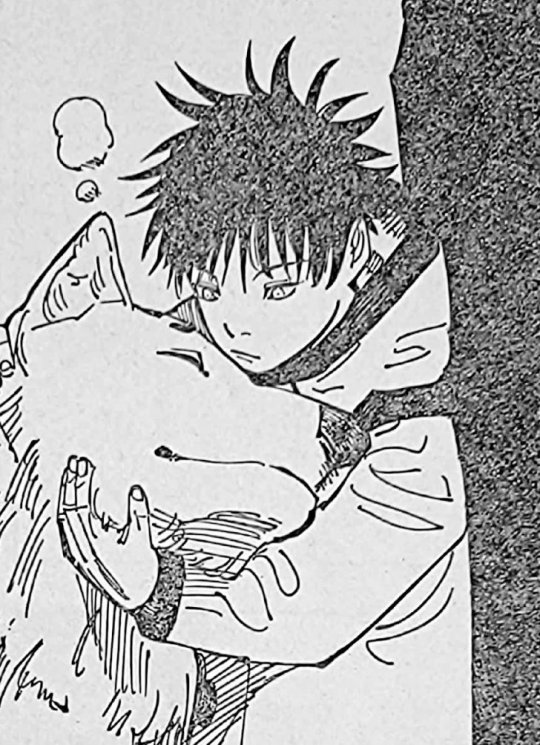
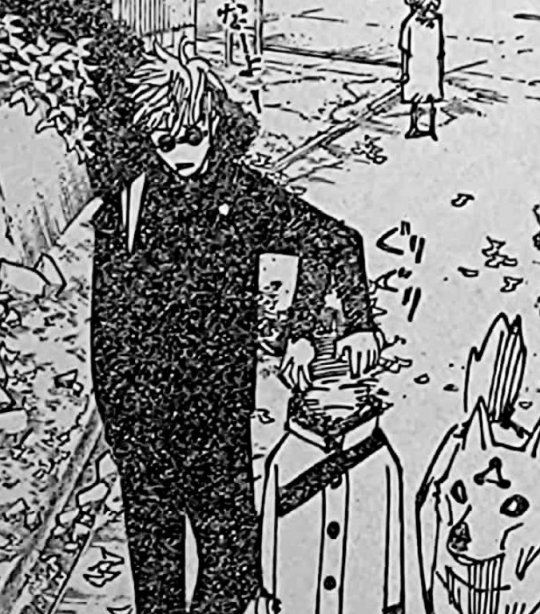
KID MEGUMI AND GOJO <3
#this means everything to me#jjk#jujutsu kaisen#jjk leaks#jjk 210#jjk 210 leaks#jjk manga spoilers#satoru gojo#fushiguro megumi
340 notes
·
View notes
Text
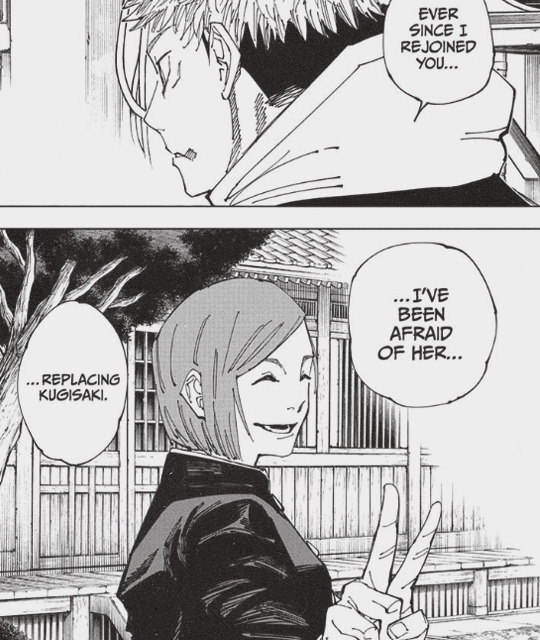
Jujutsu Kaisen, Chapter 210 Thoughts Part Two.
Yuji goes out of his way to both antagonize Hana, and remind the audience of how much he mourns Nobara in this most recent chapter. Rather than being a ship tease moment (actually this post is neutral to any kind of ships) this moment establishes the foiling on a deeper level between Yuji and Nobara. The reason Yuji cannot stand the idea of Nobara being replaced to the point where he acts almost out of character from his usual behavior is because his bond with her is special (once again this is not about shipping) in a way I'll elaborate on under the cut.
PART ONE OF THIS POST HERE.
Anima and Animus Part Two
My entire last post elaborated on how Megumi and Hana might serve as a pair of Anima / Animus archetypes in Jujutsu Kaisen, a story that is rife with Jungian symbolism. The post is RIGHT HERE and serves as the first half of this meta, but if you want a TLDR version. The anima and animus are a syzgzy (pair of complentary opposites) of dualistic jungian archetype that make of the self. The anima is the unconscious feminine side of a man. The animus is the unconscious masculine side of a woman.
Warning, this is talking about gender in binary terms. The gender binary is invented, but also most cultures have things they would consider to be feminine or masculine traits. Also, everyone is a mix of those feminine or masculine traits no matter what gender they are. Jung's theory is often a Male's sensitivity is lesser or repressed and therefore for healthy psychological development there has to be a reconciliation in both a person's attitude towards masculinity and femininity, and also how they interact with femininity in other people.
Jung divides ego between conscious mind and shadow, but he further divides the traits of a person's attitudes between feminine and masculine as another part of the ego and just as key as accepting your shadow / unconscious. Just as a quick example if you're familiar with the concept of "Toxic Masculinity" Jung would consider that a person who overexpresses his masculine side, and represses his anima to much to the point where they develop an unhealthy relationship with that masculinity, and an underdeveloped ego. If a healthy balance with one's anima/animus is needed for a person's growth and development, then someone who is toxically masculine would show a stunted growth. Similiarly many toxically masculine individuals are considered to be immature.
Now to explain some broader terminology before going ahead and connecting these ideas to Jujutsu Kaisen, Jung's theory is the division of "self" or "personality" into distinct parts, the conscious ego, the shadow, and then animus and anima.
"Clearly, then, the personality as a total phenomenon does
not coincide with the ego, that is, with the conscious personality,
but forms an entity that has to be distinguished from the ego.
Naturally the need to do this is incumbent only on a psychology
that reckons with the fact of the unconscious, but for such a
psychology the distinction is of paramount importance."
The Syzygy: Anima and Animus, C. G. Jung, Aion: Researches into the Phenomenology of the Self,
Ego is a part of personality but not the whole of it, and makes up the conscious mind. The part of their personality they are aware of. The parts we are unaware of, and are out of our control, the unconscious mind Jung refers to as the shadow.
The shadow is a moral problem that challenges the whole
ego-personality, for no one can become conscious of the shadow
without considerable moral effort. To become conscious of It
involves recognizing the dark aspects of the personality as present and real.
The Syzygy: Anima and Animus, C. G. Jung, Aion: Researches into the Phenomenology of the Self,
Yuji as the main character of the story more than anyone else, exhibits this divided self. His shadow is an entity entirely seperate from him with his own consciousness that he cannot control, Sukuna who is made up of baser instincts, a desire for power, and also mostly negative flaws. Things that would be repressed in the shining, boyscout, that is Yuji. Yuji is the only character we ever get a peak of their symbolic inner world, and in that world Yuji stands on water (a symbol of the subconscious, because the subconscious is something which lies underneath the surface of the water).
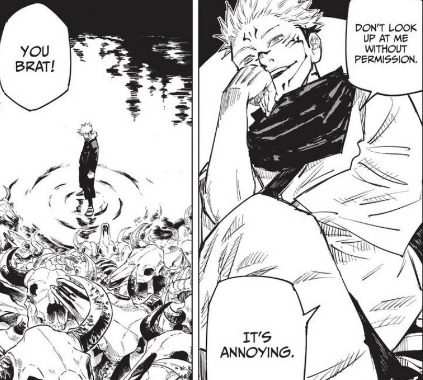
Yuji has an extremely unhealthy relationship with his shadow. They are literally at war with each other. Sukuna at moments can possess Yuji's body and make him do things he wold not normally do, be violent in a way he is not normally violent. Sukuna even refers to Yuji being unable to switch back during his possession happening because "he was too greedy."
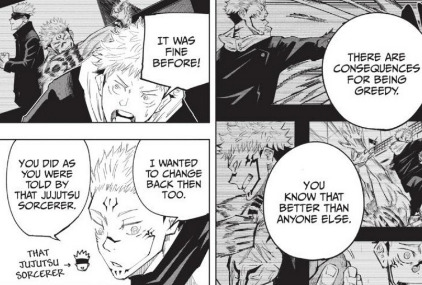
Yuji of all characters is someone who tries to present himself as a savior with a higher moral imperative, and he carries around Sukuna in his whole someone who has no value for human life, and no regard for anyone except himself. Someone who seems at first brush to be the complete and total opposite of Yuji and yet is bonded to his soul.
Although, with insight and good will, the shadow can to
some extent be assimilated into the conscious personality, experience shows that there are certain features which offer the most obstinate resistance to moral control and prove almost impossible to influence. These resistances are usually bound up with projections,, which are not recognized as such, and their recognition is a moral achievement beyond the ordinary.
The Syzygy: Anima and Animus, C. G. Jung, Aion: Researches into the Phenomenology of the Self,
Yuji's negative traits are not assimilated into his personality at all, nor is he aware of them, his relationship with his shadow is so distant that he quite literally goes into the supernatural equivalent of what would be dissociative fugue states where he loses all control of his body in a period he is not aware of.
With a little self-criticism one can see through the
shadow so far as its nature is personal. But when it appears as
an archetype, one encounters the same difficulties as with anima
and animus. In other words, it is quite within the bounds of
possibility for a man to recognize the relative evil of his nature,
but it is a rare and shattering experience for him to gaze into
the face of absolute evil.
The Syzygy: Anima and Animus, C. G. Jung, Aion: Researches into the Phenomenology of the Self,
Sukuna representing the absolute evil that Yuji cannot bear to look into the face of, or understand. Even though there are times where Yuji demonstrates the same kind of primal dominance that makes up Sukuna's entire personality. There are times where rather than the savior he is the predator.

If his relationship with Sukuna embodies the divide between conscious mind and Shadow, then Nobara serves as the symbol of his Anima. Anima appears in archetypes as well. Archetypes are often repeated characters and symbols in mythology, the hero, the mentor, the mother, etc. etc. Yuji's external relationship with Nobara, relates to his own internal relationship with his anima, the feminine side of his personality. Nobara is nothing if not feminity personified.
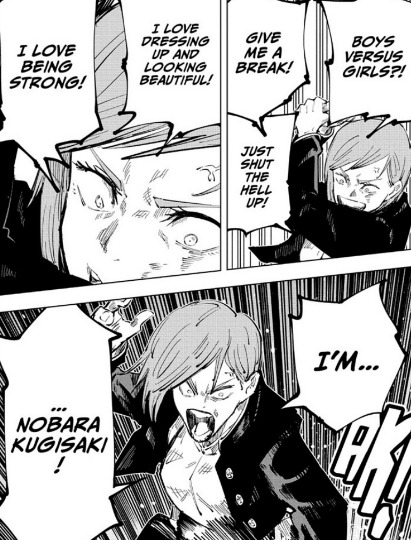
Why Nobara of all characters? It's because she is the woman with the most longstanding relationship with Yuji in the manga. In fact since I have too much free time, let's do summary of the many ways they parallel one another in their journey up until Shibuya. Yuji and Nobaraare also a pair of Anima / Animus in regards to one another. Women are also defined as having a "Animus" side that reflects their repressed masculinity.
The projection-making factor is the anima, or rather the unconscious as represented by the anima. Whenever she appears, in dreams, visions, and fantasies, she takes on personified form, thus demonstrating that the factor she embodies possesses all the outstanding characteristics of a feminine being. She is not an invention of the conscious, but a spontaneous product of the unconscios.
The Syzygy: Anima and Animus, C. G. Jung, Aion: Researches into the Phenomenology of the Self,
Nobara's introduction is called girl of Steel. Nobara's feminity is put right on dispaly first and foremost, the first thing she does is interrogate a man about recruiting her as a model because obviously she's such a pretty woman. She has also no regard for the men she meets up with seeing them as crude doodles.


Just like Sukuna and Yuji are at war with each other, Nobara and Yuji start out completely combative to one another. This is par the course for the first encounter of Anima / Animus. This is also once again not really a romantic connection.
This singular fact is due to the following circumstance: when animus and anima meet, the animus draws his sword of power and the anima ejects her poison of illusion and seduction.
In both its positive and its negative aspects the anima/animus relationship is always full of “animosity”, i.e., it is emotional, and hence collective. Affects lower the level of the relationship and bring it closer to the common instinctual basis, which no longer has anything individual about it.
The Syzygy: Anima and Animus, C. G. Jung, Aion: Researches into the Phenomenology of the Self,
IE: Both start out in opposition to each other, but need to form a relationship and work together in order to slay the curse. Megumi is also left out of the mission, further solidifying Yuji and Nobara from introduction as a pair.
I would say rather Anima and Animus characters are not primed to understand each other especially with underdeveloped characters at the beginning of their arcs. That's essentially what Yuji remarks he can't read or understand Nobara at all, she's a mystery to him. Nobara also does not really want to accept Yuji's cooperation or coordinate with him at all.
Right away though, Gojo draws a parallel between the two of them. Gojo establishes that Yuji is crazy like many Jujutsu Sorcerers, and he's trying to test Nobara for that same craziness. (Needless to say Nobara passes).
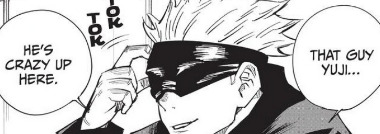

I've already made reference to the fact that Yuji's whole sense of self is continually at war with himself, his unhealthy self-image first explodes in the fearsome womb arc. An arc where ironically Nobara and Yuji are separated from each other right away. (I mention this only because it's paralleled in the Origin of Obeidence arc, in this arc they work together and its a culmination of their long developed relationship).
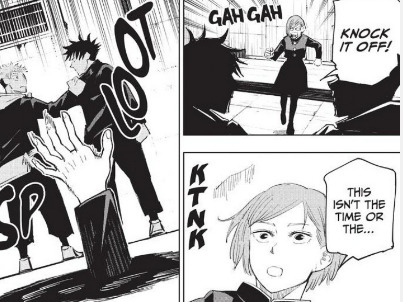
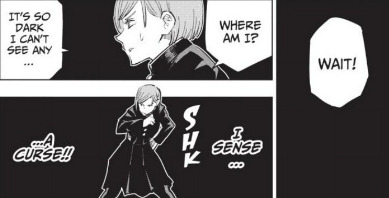
Nobara even falls deep into a literal shadow. She is transported into a dark place where she cannot see. Rather than being aware of his anima, his anima is once again pushed to the deepest parts of Yuji's mind. This is also the first time he loses control of himself to Sukuna.

Nobara weeps over his first death and being left alone. Something that will be paralleled once again when it is Nobara's time to die and leave Yuji alone. I would argue they are both shown to be deeply affected by the loss, because they are essentially losing what is essentially the masculine / feminine halves of themselves. If they are a pair, then without one another they are symbolically incomplete.
I'm not underplaying Megumi's mourning, just that attention is drawn to Nobara's mourning, just like in this week's chapter Yuji moreso than Megumi fears that after Nobara's "death" she may lose that special place in his heart.
FLash forward to the Kyoto Battle arc, Nobara's reason for being angry at Mai is not only her insulting of Maki, but the way she dismisses Yuji as a curse, and tries to kill him with the rest of the Kyoto students without getting to know him. You could also say this is a point where Nobara overexpresses her feminine traits, and neglects her masculine ones. SHe basically yells at the top of her lungs she doesn't really care about the misogyny Mai faces under the Zenin Clan, she is compeltely unaware of her own harmful prejudices.


While not to the same extent as Yuji because she's not running around with a demon in her head, I'd argue that Nobara is also someone who is not in harmony with her feminine and masculine sides.
Nobara is, unconscious of her more amoral traits like her lack of guilt for killing Choso's brothers, she's someone who just like Yuji embraces the "might makes right" and "getting stronger solves everything" of the Jujutusu World. In fact since she's not out to save people you could say she embraces it more than Yuji. Violence is something typically considered a masculine trait. She also worships the stronger of the Zenin twins Maki, while despising Mai for her weakness.
Origin of Obedince which is basically the last big development arc of the relationships of the main character trio together, Nobara and Yuji's cooperation is shown to come full circle from their introduction and they are in near perfect harmony with one another. They even Black Flash together.
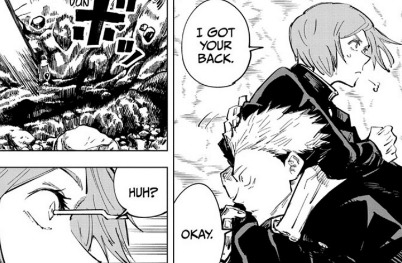

This may be an overreach but Yuji and Nobara are also fighting the Death Painting Sibs, their philosophy is "we three are one" but the fact that Yuji and Nobara triumps means at this moment their harmony with one another is stronger than that.
Nobara and Yuji go through an arc where they are essential to one another's growth, just as for Animus and Anima there are stages of development known as Eros and Logos.
Just as the anima becomes, through integration,
the Eros of consciousness, so the animus becomes a Logos; and
in the same way that the anima gives relationship and relatedness to a man's consciousness, the animus gives to woman's
consciousness a capacity for reflection, deliberation, and self knowledge.
The Syzygy: Anima and Animus, C. G. Jung, Aion: Researches into the Phenomenology of the Self,
Eros and Logos are four stages of development where the respective Anima and Animus are developed as people become more conscious of their opposite sides. A man at the first stage with an underdeveloped Anima, does not only make an object of love or desire out of women they see both women and feminine traits as completely unintegrated and seperate from themselves. At the fourth stage a man's anima is fully integrated into their personality and they are able to be seen as particular individuals as both positive and negative qualities. As for Logos, ironically enough their first level is an animus that first appears as a personification of mere physical power, for instance an athletic champion a muscle man. And in its fourth manifestation an animus is the incarnation of meaning. At this stage there's mediation between the conscious and unconscious mind.
For example, Yuji learns cooperation with Nobara at the peak of his development where he didn't understand her at all to begin with. For example, Nobara is an extremely brutal and conflict oriented character to begin with, at the end of their relationship arc so far she is working in harmony with Yuji.
Further parallels between the two of them. They both have plant names. Translated by @kaibutsushidousha right here. That's not as strong as a character because a lot of characters have names associated with plants. However, Yuji's plant is named for a medicinal herb.
Japanese Knotweed: There are a lot of ways to tie this to Itadori’s two sides as himself and Sukuna, but in Akutami’s interview on Mandou Kobayashi, they explained that they simply picked the name of a medicinal herb because Itadori was a protagonist who saves people, so I’m not sure if any deeper meaning was intended on this one specifically.
Japanese knotweeds are really nice as medicinal herbs, but on the flip side, the Japanese knotweed is one of the most invasive species in the world, so I think the plant choice also doubles as a nod to Itadori’s (or rather Sukuna’s) status as a plague to curser society.
Nobara was named for a wild Rose, because "I wanted to make it thorny" this is from the databook.
Flower symbolism wise Nobara's also means recovery from a grave wound, just as Yuji's means medicine.
WILD ROSE In flower language, the wild rose means “unpretentious love” and “recovery from a grave wound”.
Unpretentious love refers to how Kugisaki very openly loves her friends, and how her love for people completely disregards social decorum, as her backstory is about her relationship with a person deemed an outcast, whose negative social status never made Kugisaki stop caring for her.
Recovery from a grave wound refers to how Kugisaki absolutely survived having her face blasted by Mahito in the Shibuya Incident. I believe it. She’ll come back with the coolest eyepatch.
This is a bit of a stretch but I just found it neat.
Nobara is referred to as a natural enemy to Mahito, just like Yuji was.

Yuji and Nobara have parallel deaths in the cursed womb arc, and then Shibuya arc where the two of them are separated from each other. Yuji's resolve is even similiarly brought to tears.


They are both influenced by their same sex grandparents, Nobara's grandmother taught her in sorcery, Yuji's grandfather taught him some martial arts and was his only guardian. Yuji is the one who continually brings up Nobara's death, even to this chapter, and the same way Nobara gets angry at Mai for mocking Yuji's memory, Yuji unreasonably gets mad at Hana because he's afraid she might replace Nobara who is singularly important to him.
Which as I said once again for both of them goes a step above friendship (not necessarily romance) because they are essentially symbolic of each other's male/female sides. At this point, Yuji's personality becomes even more out of balance than it was before. He embraces his hypermasculine hunter side in his fight with Mahito. Nobara's death also comes just after Yuji's loss of control to Sukuna. Once again, his repressed side taking him completely over and making him go into the magical version of a fugue state.

From this point on, Yuji also begins to extremely loathe his own weakness. Weakness can be seen as a feminine trait for someone who has an unhealthy relationship with masculinity and overexpresses it. All people are equal parts strong and weak, and have many strenghs and weaknesses but Yuji believes now he must be continually punished for his weakness. Which again makes Yuji's personality even more disordered.

Which makes Yuji's personality as a whole even more disordered. Jung emphasizes that integration of all parts of the personality, requires healthy relationships with members of the opposite sex (which is you know true, men who loathe femininity aren't going to form healthy relationships with women).
Recapitulating, I should like to emphasize that the integration of the shadow, or the realization of the personal unconscious, marks the first stage in the analytic process, and that without it a recognition of anima and animus is impossible. The
shadow can be realized only through a relation to a partner, and
anima and animus only through a relation to the opposite sex,
because only in such a relation do their projections become
operative.
The Syzygy: Anima and Animus, C. G. Jung, Aion: Researches into the Phenomenology of the Self,
Yuji, deprived of his anima is therefore all out of whack.
Yuji's unhealthy relationship with his Anima can even be traced back to his complete lack of a mother figure. Typically developmental-wise, our first interaction with a feminine force in our life is our mothers. In Jungian logic, the definition of femininity is sourced with their mothers in boys, and their fathers in girls.
The enveloping, embracing, and devouring element points
unmistakably to the mother, 2 that is, to the son's relation to the
real mother, to her imago, and to the woman who is to become
a mother for him. His Eros is passive like a child's; he hopes to
be caught, sucked in, enveloped, and devoured. He seeks, as it
were, the protecting, nourishing, charmed circle of the mother,
the condition of the infant released from every care, in which
the outside world bends over him and even forces happiness
upon him. No wonder the real world vanishes from sight!
The Syzygy: Anima and Animus, C. G. Jung, Aion: Researches into the Phenomenology of the Self,
Yuji is at war with his mother figure the same way he is at war with his shadow, considering that his biological mom is quite literally the main antagonist of the story Kenjaku, who possessed his mother's body in order to give birth to him.

Jung even notes that a person with an underdeveloped anima will become possessed by it, and therefore lose their agency over themselves and lose sight and control. Which mirrors in a way the fact Kenjaku considers Yuji nothing more than a pawn in his scheme, and endeavors to control his life.

If this situation is dramatized, as the unconscious usually
dramatizes it, then there appears before you on the psychological
stage a man living regressively, seeking his childhood and his
mother, fleeing from a cold cruel world which denies him understanding. Often a mother appears beside him who apparently shows not the slightest concern that her little son should become a man, but who, with tireless and self-immolating effort, neglectsnothing that might hinder him from growing up and marrying. You behold the secret conspiracy between mother and son, and how each helps the other to betray life.
The Syzygy: Anima and Animus, C. G. Jung, Aion: Researches into the Phenomenology of the Self,
Yuji posseses a mother figure which is completely hostile to him, and an anima which is currently either missing or dead to the story, so under such conditions no wonder Yuji's deviating from his normal personality and acting with no self awareness whatsoever to the point of becoming hostile to Hana. He is most likely insecure about his own feelings for Nobara whatever they may be if he thinks he a girl he's known for about five minutes could replace her so easily, which relates to all of Yuji's 9,000 other insecurities.

Basically, the end of this long diatribe is Nobara is someone who could help Yuji grow and find balance within himself were she to return to the story, and in her absence Yuji is psychologically speaking...a big mess.
#yuji itadori#nobara kugisaki#jjk meta#jujutsu kaisen#jujutsu kaisen meta#jujutsu kaisen theory#jujutsu kaisen 210#jjk 210#jujutsu kaisen 210 spoilers#jjk 210 spoilers#hana kurusu#megumi fushiguro
221 notes
·
View notes
Text

Sweet bonding moment with adoptive father and son (ignore the starving child in the background)
He could've at least ask what happened to her. Lend her a coat, some shoes. Wait till help arrives. Make sure she gets a snickers. Something! But fuck them kids (who aren't Megumi) I guess
Gojo's life is a very good example of what happens if you don't help homeless people.
183 notes
·
View notes
Text
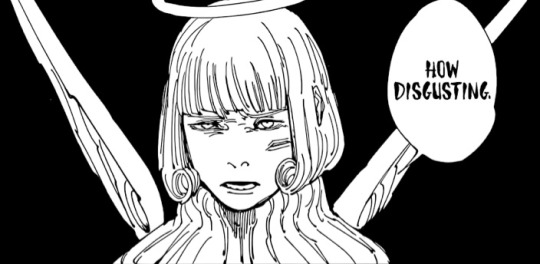
everyone shut up and look at this scrunkl
311 notes
·
View notes
Text
Jujutsu Kaisen 210 spoilers:
BRUH
Y'ALL DON'T UNDERSTAND
I HAVE BEEN DYING FOR A MOMENT LIKE THIS BETWEEN GOJO AND MEGUMI
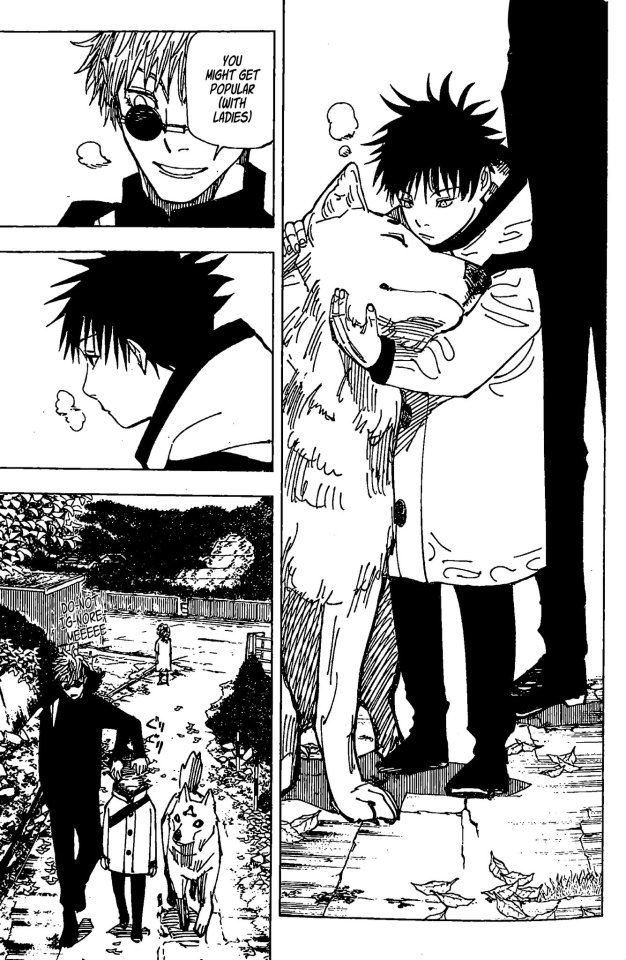
The Gojo antis swear that he was just using Megumi for the Ten Shadows. Swore that he had no real connection to him
But he's holding his little backpack
THAT'S SOME BIG BROTHER/UNCLE SHIT
Carrying a kid's backpack is not just casual, it means that you CARE (Source: Trust Me, Bro)
And RIP to the Divine Dog
149 notes
·
View notes
Text
chp 210 confirmed some of my favorite fanon things:
1. Megumi first started summoning the divine dogs as a young child, and he and the divine dogs love eachother
2. Gojo spent at least SOME time with megumi and tsumiki on a regular basis
3. Gojo would take megumi on small missions even as a child for training purposes
119 notes
·
View notes
Text

I love this goofy goober
#jjk#jjk 210#jujutsu kaisen#takaba fumihiko#fumihiko takaba#jjk manga spoilers#yuji itadori#megumi fushiguro#jjk thoughts#jjk manga
123 notes
·
View notes
Text


this is all i care about from now until the chapter is out
#BABYYYYYYYYY#jjk 210#jjk spoilers#jujutsu kaisen#teen dad gojo content 💪 good to hold us over until we get teen dad denji in two weeks lol
92 notes
·
View notes
Text
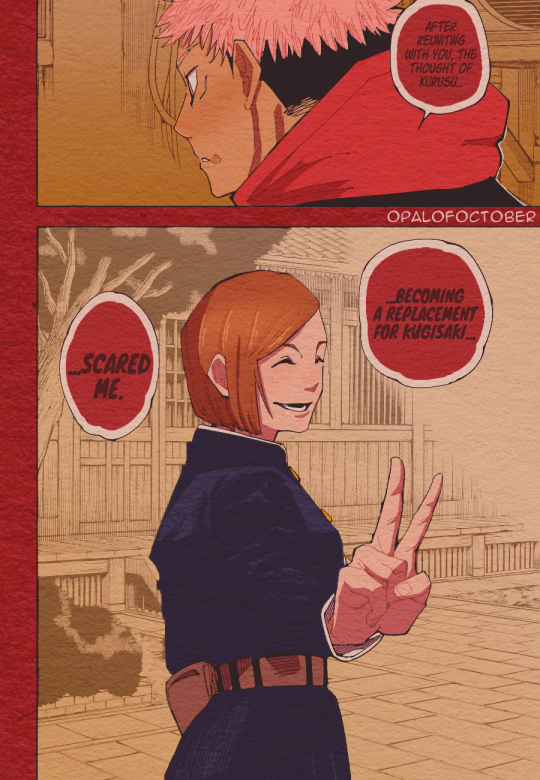
ch. 210
#jujutsu kaisen#jjk#jjkedit#yuuji itadori#nobara kugisaki#jjkdaily#dailyanime#fyeahanimanga#jujutsuedit#hyeahjujutsu#jjk spoilers#jujutsu kaisen spoilers#jjk 210#graphics-net#opalofoctoberedits
76 notes
·
View notes
Photo
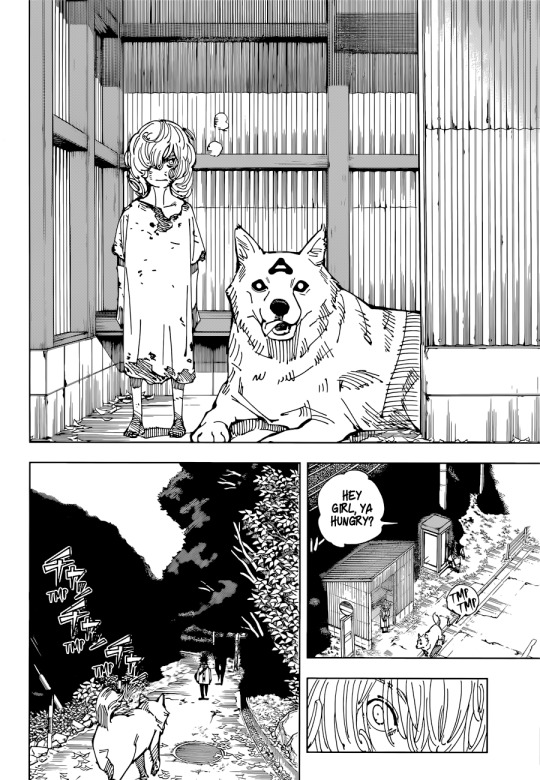
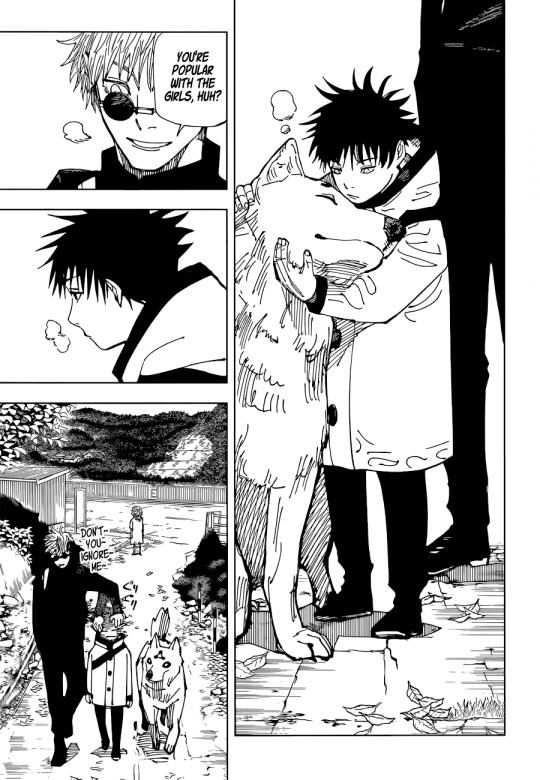
Awww - I love this scene so much!!!
78 notes
·
View notes
Text

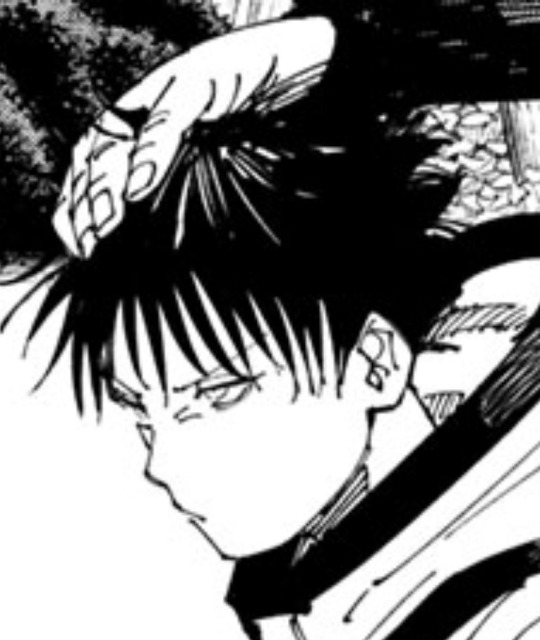
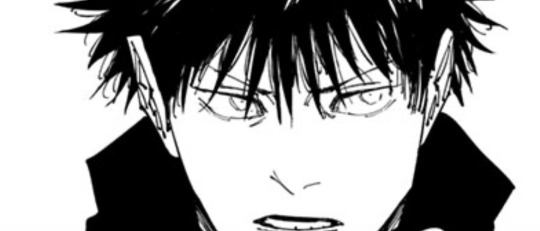

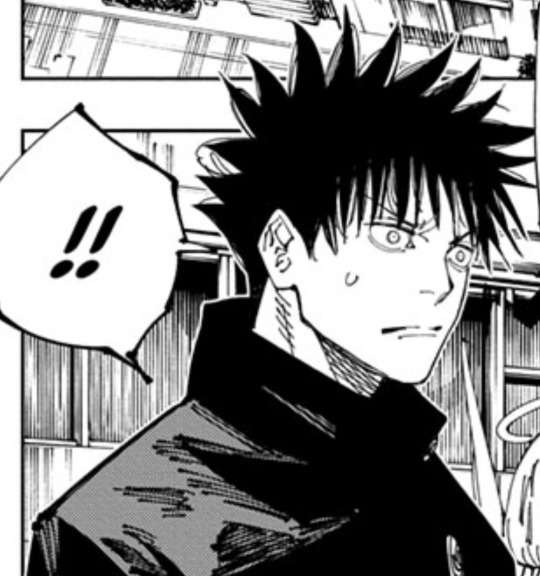

important fushi’s
#呪術廻戦#jjk#jujutsu kaisen#jjk 210#jjk 211#fushiguro megumi#megumi fushiguro#𓆟#fish food#hes…everything to me tbh
78 notes
·
View notes
Photo

Take her hand
#jjk 210#jjk manga spoilers#hana kurusu#angel#jjk art#jjk fanart#jjk angel#angel jjk#jujutsu kaisen#digital art#artists on tumblr
98 notes
·
View notes
Text

Jujutsu Kaisen, Chapter 210 Thoughts.
In one chapter, Hana Kurusu went from a minor character to one of the most interesting characters in the culling game. That may sound like I'm jumping the gun, but this one short chapter sets up a lot in terms of Hana, not only her connection to Megumi, but how she foils both Megumi and Yuji. An analysis on Hana and where I think her character may be going underneath the cut.
PART TWO OF THIS POST HERE.
The Anima / Animus
There’s a reason that Yuji brings up Nobara, in the same chapter that Hana’s backstory and connection to Megumi is explained and it has nothing to do with shipping, actually. Hana is connected to Megumi by being his symbolic Anima in the story.
The anima and aninmus are what Jung terms a “Sygzy”, a tearm used by Jung to mean a union of opposites. It is similar to the eastern concept of Yin and Yang. Just like the feminine Yin, and the Masculine Yang, each contain a taenite, a dot that represents the yin within the yang and the yang within the yin. That therefore there exists masculinity within the feminine Yin, and femininity within the masculine yang. Anima is the unconscious feminine side of a man, and anima the unconscious masculine side of a woman, each making up the personal psyche.
In other words Megumi and Hana Kurusu are a pair. Not a ship. Just a pair of characters who are symbolically linked to one another. In some ways literal. It’s established alone not only is Hanas idea of what a good person is built around the idea of Megumi, but she shapes her personality based on what she thinks would make herself worthy to be by his side. Megumi already represents an aspect of Hana’s self, and arguably it works the other way around. Jung believed a male’s sensitivity is often lesser or repressed, and therefore considered the anima (the unconscious feminine side) to be one of their strongest sides. Ergo, men are more likely to repress their feminine sides, and at the same time the only way to develop those sides is to seek out femininity and interact with it. That sounds like basic rules of human interactions, the only way you can learn to have healthy relationships to other people and how to show your emotions in healthy ways is by interacting with people. A natural understanding of another member of the opposite sex is instilled in individuals that stems from constant subjection to members of the opposite sex.
However, this is where the Jungian twist comes in. Jung believed that the human mind understood things in terms of unconscious symbols, Jung was big on dream analysis. He also believed in “archetypes” which are more or less common character types that appear in all stories around the world. The hero. The mother. The mentor. Etc. Etc. Cursed spirits, are a Jungian idea.
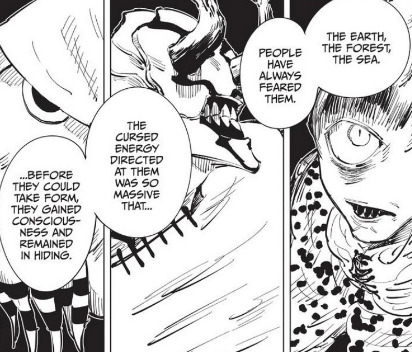
The fear of the earth, forest and sea are three archetypal fears in a Jungian sense, who anthropomorphize into Jogo, Hanami and Dagon. Jujutsu Kaisen is a story written using Jungian themes, that the subconscious shared among all human beings creates archetypes like this in their stories. Jogo is the personification of the earth. Hanami the forest. Dagon the sea. They are all archetypes shared across many stories. Here’s a common example of Jung’s argument for archetypes existing... how many stories around the world have a tale of a great flood?
This brief explanation of archetypes is all to say, the Anima / Animus pairing is also an archetype that exists in stories. Jung defines archetypes as character that reoccur in mythology all around the world. He used several examples of female characters in mythology who are made to represent an inner feminine side of their masculine counterparts and associated them with Anima. Examples such as Persephone springtime goddess and wife of Hades. Minerva who serves as a feminine counterpart to Mars and Roman Culture, because Mars represents the violence of war and Athena the strategy. Eve, of Adam and Eve. Quite literally birthed from Adam’s own ribcage.
“The anima is the feminine aspect of the archetypal male/female duality whose projections in the external world can be traced through myth, philosophy and religious doctrine. This duality is often represented in mythical syzygy symbols, which are expressions of parental imagos the singular power of this particular archetype is considered due to an unusually intense repression of the unconscious material considering the parental imagos. Carl G. Jung in 1929
The gender binary is just a made up binary of course but that doesn’t change the fact all socieities have what you would call “feminine” and “masculine” traits, and all people contain both of these traits. A healthy individual balances these traits. Jung’s idea is more or less people need to develop both of these traits inside of them in order to be a healthy individual. A man who suppresses all of his feminine traits will be underdeveloped because he’s unbalanced.
“The persona, the ideal picture of a man as he should be, is inwardly compensated by feminine weakness, and as the indivdual outwardly plays the strong man, so he beecomes inwardly a woman, the anima, for it is the anima that reacts to that persona. But because the inner world is dark and invisible to the extraverted consciousness, and because a man is all the less capable of conceiving his weaknesses the more he is identified with the person, the persona’s counterpart the anima remains completely in the dark and is at once projected so that our hero comes under the heel of his wife’s slipper.” Two essays on analytical SPsychology, CW7 (1957) “The relationships between the Ego and the Uncosncious” P. 309
In a fictional story therefore, a character who represses his more feminine or what he would consider his vulnerable traits is going to end up projecting those traits outward. He will create an archetype of the Anima which is all of those feminine traits he holds within himself, externalized into another character.
Jung is making a case that how we interact with feminine and masculine traits within ourselves, is first modeled to us in our formative years either by our parents or the next best thing. For example and this is speaking in the broadest terms, for a lot of children their first exposure to feminity is with their mothers, and masculinity is in their relationship to their fathers.
Archetypal images are described as pre-existent, available and active from the moment of birth as possibilities of ideas which are subsequently elaborated on by the individual.
The anima image is seen to be active in childhood projecting superhuman qualities on the mother before sinking back into the unconscious under the influence of external reality...” Carl G. Jung in 1929
Megumi as it stands does not have a mother or a father, so he is already missing out on this most positive formative relationship.
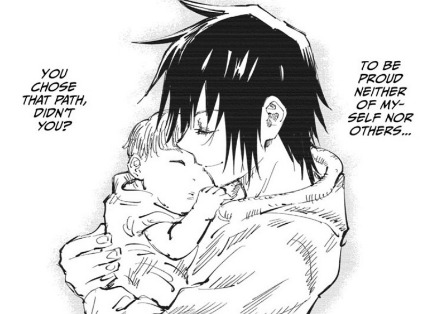

You can even see a small display of the anima / animus dynamic between Toji and Megumama. In extra material Gege states Megumi’s mother was enough to convince Toji to give up his unstable lifestyle and stay around for awhile, nurturing a more domestic side of him. When she dies, Toji becomes an incredibly toxic individual abandoning his family and focusing on his most toxic and extreme masculine traits, his habits of making money only to waste it on hedonism, his denial of any kind of affection of Megumi, his extremely violent lifestyle.
Toji is a lot of things, but from a Jungian Perspective he is incredibly out of balance. He represses all of his weaker, what would be considered feminine traits in order to try to express his masculine ones and all it results in is a mess of a person.
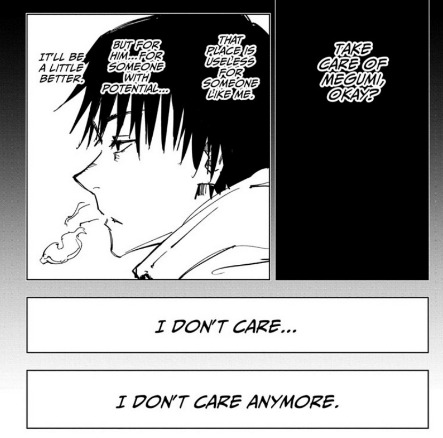
Megumi is in many ways a parallel to Toji. They look almost identical at times, especially in moments where Megumi is about to get violent. Megumi is not an overtly masculine character like Toji, if anything he is downright boyish at times and yet he shares the same lack of balance that Toji does because Megumi is also an incredibly repressed individual.
Megumi has a habit in the manga of flipping the fuck out. That’s the scientific term for it. A jungian perspective would argue this is because Megumi as an orphan abandoned by both mother and father who does not have formative memories of either, he has not been taught how to balance this duality within himself. In fact the only family member Megumi had as a young age to model what correct behavior is, was Tsumiki herself.
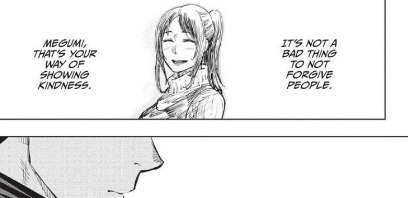
It starts all the way back at this scene. Todo asks Megumi what his type of person is, and we see a brief flash of Tsumiki. This isn’t to suggest that Megumi is subconsciously attracted to Tsumiki, but rather she is the image of what a good person is in his mind.
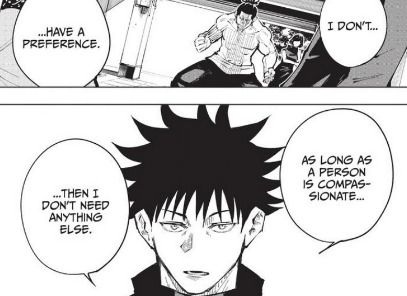
Megumi’s idea of goodness is based around Tsumiki, the same way our parents are supposed to instill morals in us and model correct behavior, but Megumi does not have parents. He has an older sister, so his entire idea of the way people are supposed to behave is based off of that person his only real social connection. However, we learn into Megumi’s backstory that despite living with Tsumiki for so long, he also lost her in a sudden and uncontrollable accident.

Megumi is robbed of that important and formative connection. If his only model for goodness and proper behavior is gone, then what does Megumi have left to guide him? Megumi is definitely not toxically masculine to the extent that Toji is, but he is as an individual underdeveloped. He’s not very emotive. He doesn’t really express himself whatsoever. He is rarely truthful with his friends unless they badger them into it, and will outright keep secrets. Gojo even comments on his habit of always sacrificing himself rather than going after what he wants.
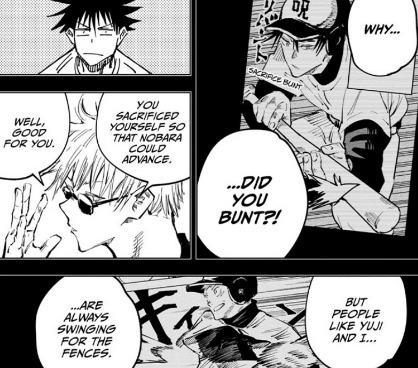
Toji brazenly displays his power as the sorcerer killer in an attempt to deny all vulnerability and cover it up with a display of toxic masculinity. On the other hand I would say that due to the only important female in his life, Megumi is stunted. He has a growing dark side that Megumi himself seems unaware of, that at moments makes him act in ways that are dangerously similiar to Toji, especially when he uses his power in anger to cover up vulnerability. Gege even establishes these with pretty clear visual parallels between father and son.

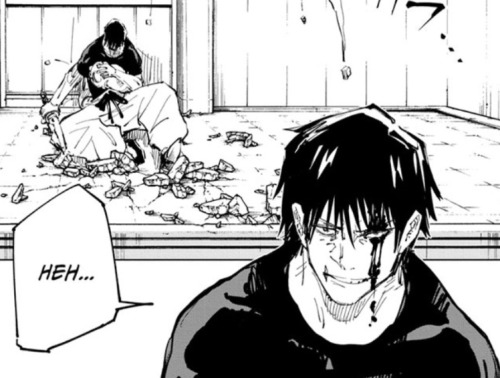
When Megumi loses control he tends to rely on his more masculine, aggressive traits we see this at the end of his fight in the Culling Games Arc. Remi as she is fleeing associates men with wolves, and it’s megumi’s black wolf specifically that is chasing her. It’s a big black wolf, chasing after a woman, who has been regularly taken advantage of by the men in her life. The symbolism is pretty overt. A man who has a underdeveloped anima side is therefore not going to interact well with feminity because those traits within themselves are out of balance.

What stops Megumi right away though is the image of Tsumiki. THe person who before she was taken away from him, modeled a more correct way to relate to vulnerability. Tsumiki who advocates for nurturing, forgiving others, an incredibly feminine figure in Megumi’s life.

However, ti’s at this moment that Megumi first encounters Hana. Who I am arguging is Megumi’s true anima character. She is his feminine counterpart in the story, he is meant to interact with in order to develop a fuller sense of self, and reconcile these traits that are at war within himself.
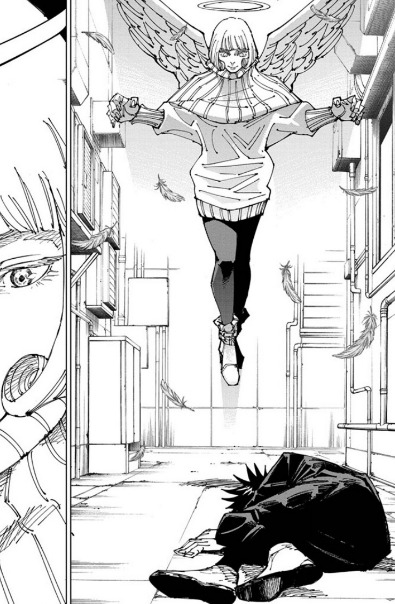
The projection-making factor is the anima, or rather the unconscious as represented by the anima. Whenever she appears, in dreams, visions, and fantasies, she takes on personified form, thus demonstrating that the factor she embodies possesses all the outstanding characteristics of a feminine being. She is not an invention of the conscious, but a spontaneous product of the unconscious. Nor is she a substitute figure for the mother. On the contrary, there is every likelihood that the numinous qualities which make the mother-imago so dangerously powerful derive from the collective archetype of the anima, which is incarnated anew in every male child. [The Syzygy: Anime and Animus, C.G. Jung, Aion: Researches into the PHenomenology of the Self, P. 11-22
A lot of people are saying Hana is female Yuji, which is just incorrect. She is female Megumi. The same way that Megumi’s entire ideal of what a good person is, is built around the image of Tsumiki the only person in his life to show him care and compassion. Hana is similar to Megumi an orphan with no father or mother figure.
In fact she is one step further because the maternal figure and caretaker she did have was a a curse that barely provided for them and then ate children.


Megumi’s intervention was the only demonstration of caring she ever had, just like Tsumiki’s was for Megumi, and on top of that Megumi was someone of a similar age just like how Megumi and Tsumiki are siblings only a few years apart. They are both people whose entire moral identity is modeled around someone else. The opposite to the Anima is the Animus. The masculine side of women. Just like the first exposure to femininity is usually the relationship with the mother, the first exposure to masculinity is with the father.
Woman is compensated by a masculine element and therefore her unconscious has, so to speak, a masculine imprint. This results in a considerable psychological difference between men and women, and accordingly I have called the projection-making factor in women the animus, which means mind or spirit. The animus corresponds to the paternal Logos just as the anima corresponds to the maternal Eros.
[The Syzygy: Anime and Animus, C.G. Jung, Aion: Researches into the PHenomenology of the Self, P. 11-22
However, Megumi demonstrates that masculinity instead by protecting and saving her with his white wolf. The same way that Tsumiki demonstrated a healthy femininity with her decision to care and watch out for her brother and try to impress some morals upon him. He is in every way her animus, the same way she is his anima.
Hana’s design and name also share several symbols of the anima. Jung believed that four distinct level of “Eros” which he named, Eve, Helen, Mary and Sophia are the process which a man undergoes to open up to greater emotionality within himself.
Eros named after the god of love, the roman version of cupid, both versions are depicted often as men with wings, which was obviously a symbol that christianity co-opted for their most typical portrayals of cherubic angels. Angel is quite literally a christian angel with a halo and everything, she also visually calls up the imagery of Eros because once again christian angels are designed after Eros.
The first stage of development of the Eros is named the Eve - the object of desire, provider of nourishment, security and love. Named after the Genesis account of Adam and Eve. At this point the Anima is tied up with woman as a provider of nourishment, security and love. The man at this animal cannot function well without a woman. The same way that Megumi himself, is out of balance due to the fact that Tsumiki, his literal only healthy familial relationship is missing from his life. In fact his entire goal right now is to rescue Tsumiki in order to restore that balance in himself again.
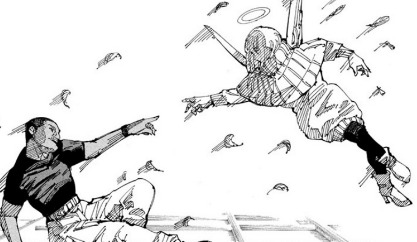
The painting this is invoking isn’t subtle, it’s Da Vinci’s famous painting the “The Creation of Adam.” Hana is appearing as a godlike figure to rescue a man in this scene. The way at this stage of Eros, the Eve appears to him to help him as well, the same way she showed up practically out of nowhere to help Megumi in his greatest time of need. Hana is being presented to us as an otherworldly figure, who’s only real desire is to be helpful to Megumi.

She also immediately makes claims of destiny and connection between them She is in a way destined for him, because she represents the Eros side, the part of Megumi’s emotions that he is meant to learn to integrate so he can become a fuller, more well-rounded person. They are even connected down to their names.
I consulted on the Kanji of Hana’s name with my friend and bully @kaibutsushidousha
Link: 来栖華 Hana Kurusu
Kai: 華 is a kanji that rarely means "flower" but more often means "luxury" or "lavishness"
Kai: Now Kurusu's kanji means "upcoming nest", obviously because she's the Angel's host
Kai: But also. Kurusu is pronounced “Cross” because of the angel of chrstianity.
Kai: Wait. Wait. Wait. I figured out Hana. It’s the japanese spelling of the hebrew name “Hannah.” Name meaning “blessing, favor, grace” or in japanese “Megumi.”
Kai: Hana = Megumi.
Kai: Because their soulmates (Hana Kurusu is holding me at gunpoint to say this)
On one, final note I want to mention that an anima / animus relationship does not necessarily have to be coded romantically. All it means is a character made to represent Megumi’s repressed feminine side in the story he is meant to interact with in order to develop as a character. Jung even mentions that they could become a romantic pair, but it’s just as likely they could argue as well.
This singular fact is due to the following circumstance: when animus and anima meet, the animus draws his sword of power and the anima ejects her poison of illusion and seduction. The outcome need not always be negative, since the two are equally likely to fall in love (a special instance of love at first sight). [The Syzygy: Anime and Animus, C.G. Jung, Aion: Researches into the PHenomenology of the Self, P. 11-22]
In other words, they are just as likely to come to blows, as fall in love. I’m not making a prediction in regards to either, because we barely know anything about Hana yet besides her origin. However, they already have a conflict set up, Hana’s desire to exterminate Yuji’s is the exact opposite of Megumi’s to save him.
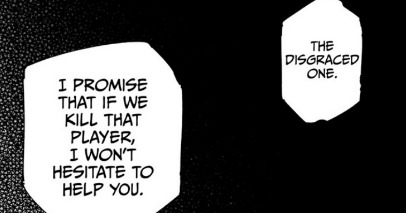
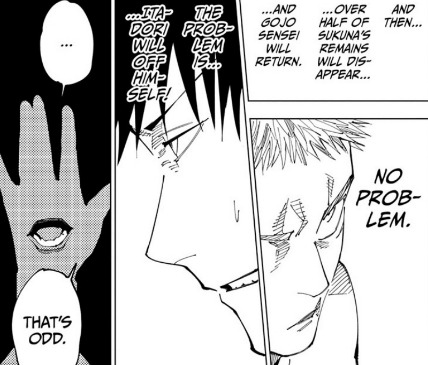
On top of that, despite the fact that they both show a desire to help the people closest to them in order to stand alongside them, you could say Hana’s moral views paint Megumi’s in much more selfish terms. Um, basically Megumi sort of dresses up his desires in ideas of justice and fairness. When really his only desire is to selfishly save a few people closest to him.
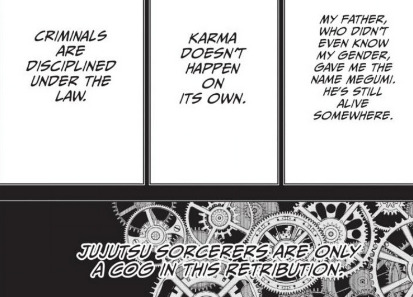
Of course Megumi states this too, that he only picks and chooses who he saves selfishly. He’s not out to be a hero. He is half-aware that these are just his selfish ideals and desires not a heroic sense of right and wrong he is working under.
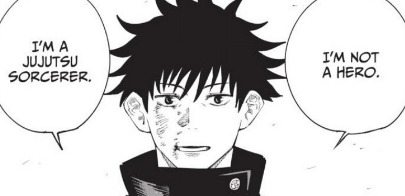
On the other hand it’s clear Megumi puts people like Yuji who will recklessly save anyone, and Tsumiki who will not curse others on a pedestal. They are what good people are in his mind. He thinks Yuji’s ideals are better than his. Megumi is worshiping an idealism he cannot live up to.

Whereas, Hana is much more upfront about the selfishness of her desire to help people. For one, she expresses a pretty similar morality to what Megumi is always saying, that they don’t have to go out of their way to save people. Megumi probably thinks that Yuji’s thinking is more correct than his way of thinking, but he doesn’t really argue with Angel / Hana either. That is probably something that Megumi would have said in this situation if Angel hadn’t, that they really don’t benefit in the longrun from going out of their way to save all the soldiers and the more pragmatic option is to help the greater amount of people by doing something that can put an end to the culling games.
If anything Hana/Angel’s confrontation with Yuji here, reflects the same kind of confrontation that he and Megumi had in the reform school. That Yuji shouldn’t go out of his way to save a convicted crimminal or risk himself or the mission because they are not worth it. Another way in which Hana/Angel displays her similarity as the feminine / anima half of Megumi.
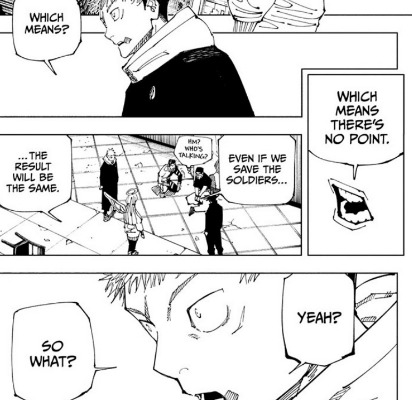
Megumi even goes out of his way to lecture Yuji for picking a fight with her on purpose. Further evidence he doesn’t really find Hana/Angel’s position all that disagreeable, she was expressing a sentiment that Megumi would usually express, and it was Yuji who went out of his way to argue with her Megumi didn’t object in any real way.
Even when Kurusu does save a solider, it’s not out of the goodness of her heart. Megumi picks and chooses who to save selfishly because he wants to protect and cherish the few good people in his life, Tsumiki, Yuji. The unstated part of that is also, he wants to keep them by his side. He’s saddened by the loss of Tsumiki and is currently trying to get her back which is his number one priority for entering the culling games. Hana similarly goes out of her way to help a solider, but her internal reasoning is revealed to us. She’s not doing it out of the goodness of her heart. Much like Megumi’s relationship to Tsumiki or Yuji. Megumi is her definition of a good person, and she wants to be a person worthy of being by Megumi’s side.
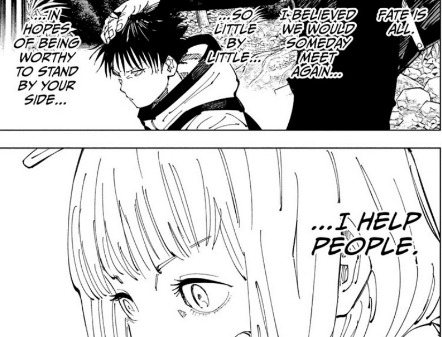
Her act of saving someone is really just as selfish as Megumi, but done out of a human desire to connect. That’s what an anima / animus pairing do in a story, they seek out each other, because they need the other in order to grow.
And that’s all I have to say about that. I am going to continue this post in a part two because I seriously did not expect the first part to get this long and I want to have mercy on my readers. U
#hana kurusu#jjk meta#jujutsu kaisen meta#jujutsu kaisen#jujutsu kaisen theory#jujutsu kaisen analysis#megumi fushiguro#itadori yuji#tsumiki fushiguro#angel#culling games arc#jjk 210#jjk 210 spoilers#jujutsu kaisen 210#jujutsu kaisen 210 spoilers
212 notes
·
View notes